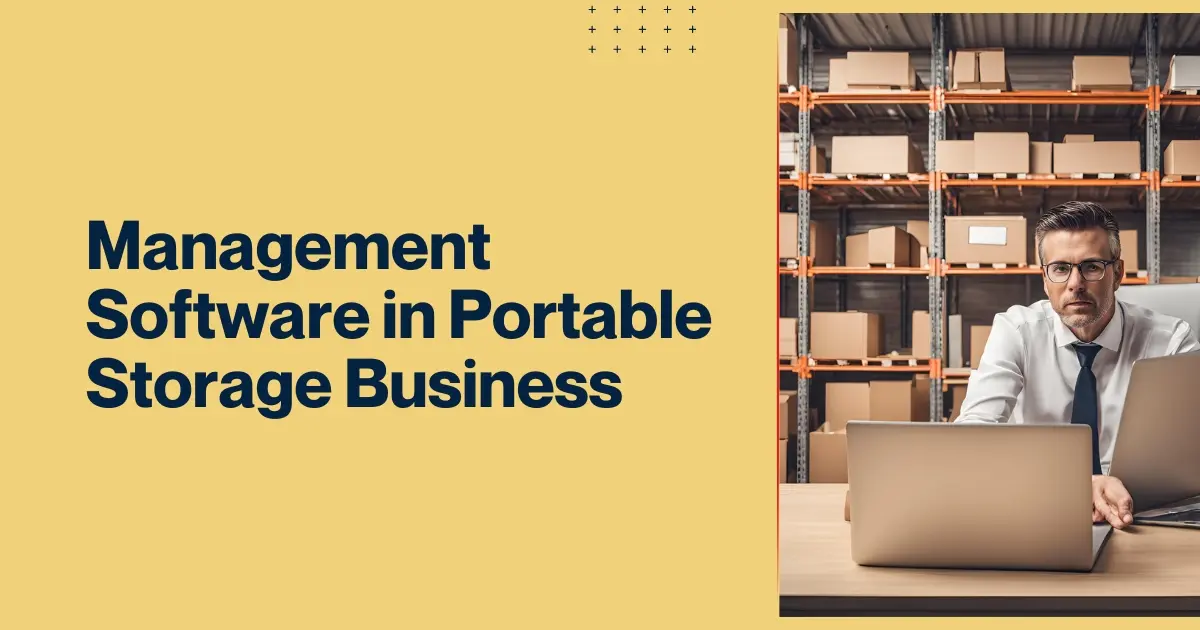According to Statistics, the portable storage containers market was valued at $100.1 million in 2023 and is expected to reach $200.1 million by 2030, with a Compound Annual Growth Rate of 10.5%.
Portable storage management software is a prime example of a technological intervention that caters to the evolving needs of global commerce in logistics. This innovative solution not only simplifies the container handling process but also significantly boosts efficiency and effectiveness in the portable storage industry, offering tangible benefits to businesses.
Keep scrolling to learn more about the role of portable storage management software in the seamless movement of portable containers worldwide.
Key Functionalities of Business Management Software in the Portable Storage Industry
1. Optimized Container Utilization:
Portable storage management software empowers portable companies to maximize the use of their container fleets. These systems utilize advanced analytics and real-time data insights to optimize container placement within shipping yards. They help achieve significant operational efficiencies by minimizing empty container repositioning and reducing handling costs.
2. Enhanced Security and Compliance:
Portable storage management software is vital in safeguarding cargo integrity, which is paramount in the portable storage industry. These systems mitigate the risk of theft, tampering, and unauthorized access with tamper-proof sales and electronic documentation features. Moreover, they ensure compliance with regulatory standards, enhancing security and reducing potential liabilities.
3. Facilitating Collaboration and Communication:
Effective communication and collaboration are essential for smooth logistics operations. Portable storage management software is a centralized platform, enabling stakeholders to share information and coordinate activities seamlessly. All parties involved, from portable companies to terminal operators, can access real-time updates on shipment status and delivery schedules, improving decision-making and enhancing customer service.
4. Predictive Maintenance and Asset Tracking:
More than managing container movements, portable storage management software offers predictive maintenance capabilities by monitoring container conditions and usage patterns. With these predictive capabilities, they can identify maintenance needs before they escalate into costly repairs. In addition to this, they track container assets throughout their lifecycle and provide valuable insights into asset utilization and depreciation, ultimately optimizing asset management strategies.
5. Data-Driven Insights for Performance Optimization:
Portable storage management software utilizes the power of data analytics to drive continuous improvement in logistics operations. They analyze historical trends and performance metrics to provide actionable insights for optimizing workflows, reducing bottlenecks, and enhancing overall efficiency. From route optimization to inventory management, data-driven decision-making becomes the cornerstone of success in container logistics, empowering you to make informed and efficient decisions.
6. Environmental Sustainability:
Portable storage management software contributes to the reduced environmental footprint of container logistics, which is increasingly focused on sustainability. These systems help reduce fuel consumption and greenhouse gas emissions by optimizing routes and minimizing unnecessary container movements.
7. Scalability and Adaptability:
As the demands of the portable storage industry evolve, business management software offers scalability and adaptability to meet changing needs. Whether it’s scaling operations to accommodate growing volumes or adapting to new regulations and industry standards, these systems provide the flexibility to stay agile in a dynamic market landscape. With customizable features and modular architecture, they can be tailored to suit the unique requirements of different portable companies and logistics networks.
Conclusion
In today’s competitive global market, adopting portable storage management software has become necessary for portable companies. This technology paves the way for a greater efficient and profitable portable storage container business by optimizing container utilization, enhancing security and compliance, facilitating collaboration, offering predictive maintenance, providing data-driven insights, promoting environmental sustainability, and ensuring scalability and adaptability.
Utilizing these advanced systems efficiently is essential to overcoming the complexities of modern container logistics and staying ahead of the curve in the ever-evolving portable storage industry.

